A standout basketball and baseball player in high school and college, Jerry Colangelo became a multisport luminary thanks to inspiration drawn from his humble Italian roots in Chicago Heights.
When Jerry Colangelo was 7 years old, he was given his first basketball, a simple act that ignited the fuse to an extraordinarily successful career in national and international sports.
“I smelled the leather, and it was the beginning of a love affair that has lasted a lifetime,” Colangelo tells Fra Noi in a wide-ranging interview about his life and myriad achievements as a player, coach, administrator, owner and overall leader. “Basketball opened the door to everything that happened.”
Colangelo has left an indelible mark on the sport while making major forays into baseball, hockey, arena football and indoor soccer. When people ask the 81-year-old sports mogul what his secret is, his answer is simple: He’s always had his priorities straight.
“The most important thing in my life is my faith,” Colangelo says. “I’m a strong Christian. Then it’s my family, my work and my community. That’s the pecking order. Always has been.
“There are a lot of people smarter than me. A lot of people with more A, B, C or whatever,” he explains. “Why was my path the way it was? It’s because God — and I truly believe this — has a plan for everyone’s life. That’s what he chose for me. All I’ve done is play out his plan.”
Frequently included in the Sporting News’ list of the most powerful people in sports, Colangelo has had plenty of honors bestowed upon him over the decades.
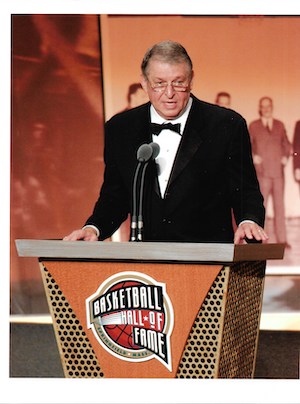
Most significantly, he was inducted into the Naismith Memorial Basketball Hall of Fame in 2004 and currently serves as the organization’s chairman. The hall unveiled the Jerry Colangelo Court of Dreams in 2012 and expanded it earlier this year as part of a $25 million renovation accomplished with major funding from Colangelo.
On Dec. 10, he will receive the Mario Andretti Lifetime Achievement Award at the National Italian American Sports Hall of Fame’s 2021 Induction and Awards Gala at the Westin O’Hare.
For details, click here.
He was inducted into that hall in 1994 and later served as its chairman. During his tenure, he spearheaded the move from the NIASHF’s longtime home in Arlington Heights to the Jerry Colangelo Center on Taylor Street.
The hall, which moved to its current location on Harlem Avenue in 2019, continues to enjoy Colangelo’s staunch support, according to NIASHF President Ron Onesti.
“He has always understood our goal of honoring those sports luminaries who shine such a positive light on the Italian-American experience,” Onesti says. “And he knows that it’s not just about our sports heroes, but our parents and grandparents. They’re the real heroes. They’re the ones who helped all of us achieve the American dream.”
Colangelo considers his upbringing in the working-class neighborhood of Hungry Hill in far south suburban Chicago Heights as central to his identity. At the time, the neighborhood was home to Americans of Italian, Polish and German descent who toiled in nearby mills and factories.
“My grandparents were immigrants from Italy. My grandfather built a small house on Hungry Hill out of the remnants of two railroad boxcars and some extra lumber. That’s the only home I lived in as a young boy,” he says. “My wake-up call every morning was my grandpa hitting the water pipes with spoons. That was my alarm clock.”
His childhood in Chicago Heights taught him the value of hard work and gave him an appreciation for the simple things in life. “Nobody really had very much, and everyone was willing to share what they had,” he recalls. “It was a place and time when people looked out for one another.”
Colangelo says he developed a passion for sports when he realized they provide a level playing field, regardless of a person’s background or status.
“I found out that everyone puts their shorts on the same way — the playing field being the parks and the sandlots for basketball and baseball in particular,” he explains. “Everyone was equal, and that gave me a confidence in life.”
Colangelo was an all-state guard in basketball and a top pitcher in baseball at Bloom High School in Chicago Heights. When he graduated, he received 66 scholarship offers for college basketball and seven professional baseball contract offers.
Chicago Heights has since honored Colangelo by naming a street after him and dedicating the Jerry Colangelo Gymnasium in 1996.
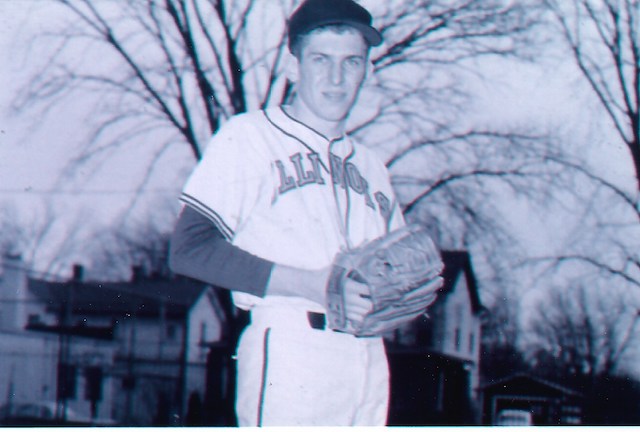
Colangelo initially enrolled at the University of Kansas but transferred to the University of Illinois at Urbana-Champaign after prospective teammate and future NBA star Wilt Chamberlain left Kansas for a professional contract.
Colangelo captained the basketball team as a senior at the U of I and earned All-Big Ten honors while playing for two years on the baseball team. He later was inducted into the Illinois Basketball Hall of Fame.
The U of I is also where he met his wife, Joan, on a blind date. The couple have four children, 10 grandchildren and three great-grandchildren.
Colangelo graduated in 1962 and was hired four years later by the Chicago Bulls, where he worked as a scout, marketing director and assistant to the president.
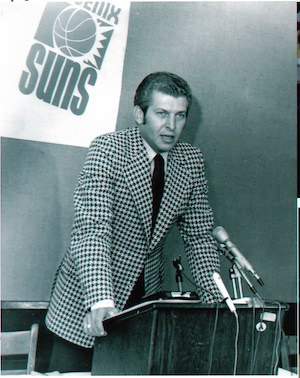
At age 28, he was hired as general manager of the Phoenix Suns for their inaugural 1968 season. He was the youngest in the sport to hold the position and ended up being the face of the franchise from 1968 through 2012.
His roles with the Suns included head coach, president, managing general partner, chief executive officer and chairman. As head coach, he guided the team to its first playoff appearance during the 1969-70 season, and holds an overall record of 59-60.
His 43-year tenure with the franchise was the longest in the NBA at the time.
“When you give birth to a franchise, it’s part of who you are,” he says. “Despite the fact I sold my interest in 2004, it’s part of me. It’s the second-longest run in the history of the NBA. I am very thankful.”
Colangelo has had a major impact on the NBA, for which he served as chairman of the board of governors from 2001-05. He was a member of the league’s finance, long range planning, expansion, and competition and rules committees. NBA Commissioner David Stern asked him to chair a special group in 2000-01 that evaluated the state of the game and made modifications to its rules.
In December 2015, Colangelo was named chairman of basketball operations for the Philadelphia 76ers. He guided the club through some key transitions, relinquishing his role late in the 2015-16 season but remaining on as a special advisor.
Colangelo says his leadership style is instinctive. “I can make a quick decision and then try to figure it out later.”
Perhaps his most widely acclaimed feat was restoring the United States as a dominant figure on the international basketball stage. He took over in 2005 as managing director of the newly organized USA Basketball men’s senior national team program.
At the time, the USA men’s team hadn’t won a major international competition in five years. After three straight Olympic golds, the team only earned bronze in Athens in 2004.
“It was evident after the debacle that some changes had to take place,” he says.
Colangelo remembers getting a call from Stern while he was recovering from successful prostate cancer surgery.
“He asked me, ‘Would you take over?’” Colangelo says. “I told him I had two conditions: I wanted full autonomy, because that’s the only way I’ve ever operated. If I have a responsibility, I have to be in charge. I have to be able to make the calls. No more decisions by commission, which is how USA Basketball was run previously.
“Secondly, I wanted to be able to do what I needed to do without any financial restrictions. That was a little tougher to get, but I got it. I assured him (Stern) that I would raise money through sale of sponsorships, etc. We quadrupled our revenues and never looked back.”
Colangelo set out to rebuild the program from the bottom up by securing the commitment of the sport’s top players and coaches.
“We had to change the culture. We had to earn back the respect we had lost,” he explains. “I made it very personal. When I selected the players, it was eyeball-to-eyeball, one-on-one, and we got buy-in right away.”
He chose hall of famer Mike Krzyzewski as the national team’s head coach. Krzyzewski served for 10 years and was succeeded by Gregg Popovich in 2017.
Under Colangelo, the national team posted a remarkable 104-7 overall record between competition and exhibition games. That included four consecutive Olympic triumphs — Beijing in 2008, London in 2012, Rio in 2016 and Tokyo this summer — and two world championships.
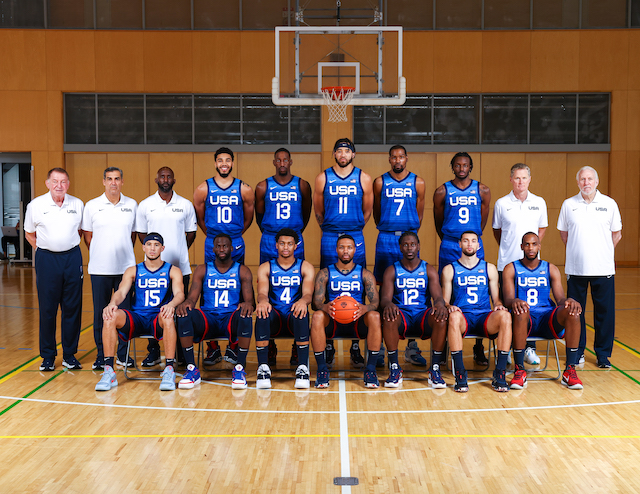
The latest Olympic gold came just before Colangelo’s retirement from USA Basketball.
“The best one is always the last one,” Colangelo told usab.com. “That’s not taking away from any of the others, but this one means a lot when you’re walking away. To finish strong, that’s what everyone dreams about.”
Team USA did have a hiccup when it finished a disappointing seventh at the 2019 World Cup, the worst result by any U.S. team in a major international competition. Colangelo attributes that to player injuries and the structure of the tournament. “We only lost two games. If you lose in a crossover game, you’re out of contention. There were teams with worse records than us that finished ahead of us.”
Colangelo also served as board chairman for USA Basketball from 2009-16. He decided to retire from the organization in August because, well, it was time.
“I think you should analyze your situation, take inventory,” he says. “There’s a time to walk away. I feel good. I am healthy. You can’t stay in a role forever.”
Colangelo made a mark in the WNBA, too, serving on its founding committee and launching the Phoenix Mercury, one of the league’s inaugural teams, in 1997.
The WNBA continues to make strides and has a bright future despite the challenges that face it, according to Colangelo. “People in the know understand it’s a business,” he says. “They have challenges, and they are addressing those challenges. There is no panacea. There is no magic wand.”
Colangelo’s entrepreneurial spirit has extended well beyond men’s and women’s basketball.
He brought Major League Baseball to Phoenix in 1998, serving as chairman and CEO of the 2001 World Series champion Arizona Diamondbacks. The team qualified for the postseason after only two seasons and won the championship two years later, both the fastest in baseball history.
“I am very proud of that,” he says.
He was ousted from the Diamondbacks in 2004 in what some observers saw as a fiscally responsible move and others as a power grab by the other general partners. When asked about the end of that run, Colangelo simply says, “I spent 10 years in baseball, and I am glad I did. That’s just part of what I have done.”
Colangelo played a key role in the 1996 move of the NHL’s Winnipeg Jets to Arizona, where they became the Phoenix Coyotes.
In 1992, he was awarded an expansion team in the Arena Football League and founded the Arizona Rattlers, which he owned for more than a decade. Under Colangelo, the team won championships in 1994 and 1997.
He also owned the Arizona Sandsharks, a founding member team of the Continental Indoor Soccer League in 1992. He sold the team four years later.
Colangelo has earned heaps of accolades in Arizona. The Arizona Republic named him the most influential sports figure in the state for the 20th century, and the Phoenix Business Journal listed him among the city’s most influential businessperson. Phoenix Mayor Phil Gordon proclaimed March 26, 2004, Jerry Colangelo Day.
“People here (in Arizona) have always appreciated me and my teams, and I was always willing to give everything I had to make them successful,” he says.
Colangelo has served on a host of nonprofit boards, including the National Italian American Foundation, Young Life International, World Sport Chicago, the Council of Leadership Education, the National Italian American Sports Hall of Fame, the Leadership Foundations of America and the Phoenix Art Museum, among many others.
“I have always been willing to serve,” he explains.
He’s also ventured into book writing. In 1999, he and Len Sherman penned “How You Play the Game,” in which Colangelo shares insights into the business of sports and his own life. Ten years later, Dan Bickley wrote “Return of the Gold” about Colangelo’s journey with the so-called “Redeem Team,” which won gold at the 2008 Olympics.
A third book might be in the works. “If I do a third, it’s going to be definitely the finale in terms of summing up my life, my career, etc., and more about legacy and things like that,” he reveals.
Nowadays, Colangelo splits his time between his residences in Phoenix and Carmel-by-the-Sea, California.
His current plans include more traveling, which he says his wife — who has supported him wholeheartedly throughout his career — would love. He especially relishes Italian destinations like Venice, Lake Como and the Amalfi Coast, as well as his family’s native Puglia.
He will never forget his first trip to Italy when he was in his late 30s, he says. “When my wife and I landed in Rome and we touched on the tarmac, I had a feeling I had arrived at home.”
The couple visited the native villages of Colangelo’s paternal grandmother and grandfather. They found his great-grandfather’s baptismal record and met an elderly couple who remembered his grandmother as a young woman before she left for the United States.
“It was a very, very emotional time for me to find my roots and connect the way we did,” he says. “Since then, I’ve gone back to Italy at least once a year.”
So is there anything people don’t know about Colangelo at this point?
“My life has been somewhat of an open book,” he muses. “I would say this: There’s no pretenses. I am who I am. I still think of myself as the kid from Hungry Hill.”
The above appears in the November 2021 issue of the print version of Fra Noi. Our gorgeous, monthly magazine contains a veritable feast of news and views, profiles and features, entertainment and culture. To subscribe, click here.
 Fra Noi Embrace Your Inner Italian
Fra Noi Embrace Your Inner Italian


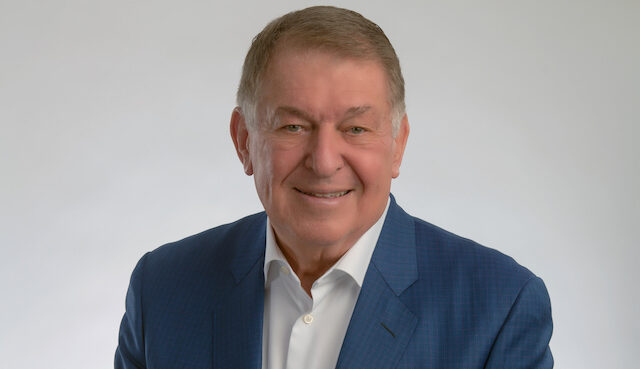





Being originally From Chicago Heights, we are especially proud of all Jerry Colangelo has accomplished in Life and in sports, coming from high-quality character and humility. God bless.